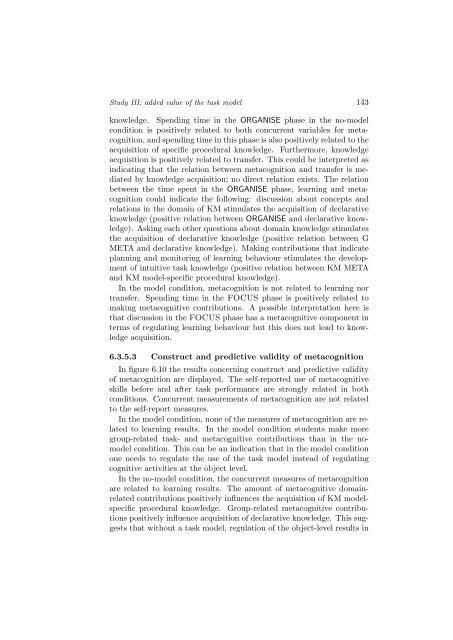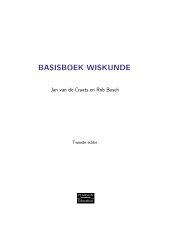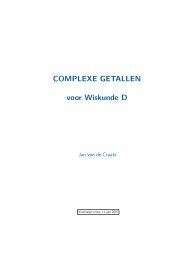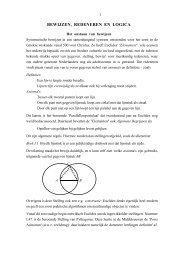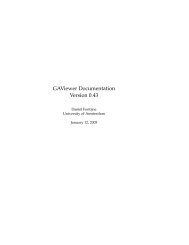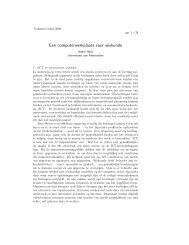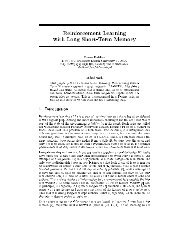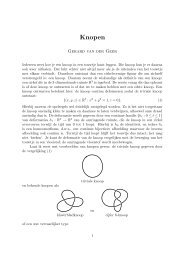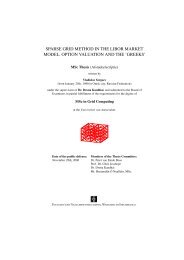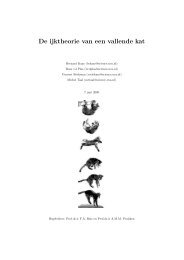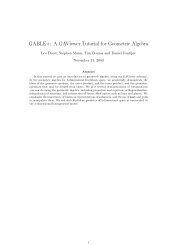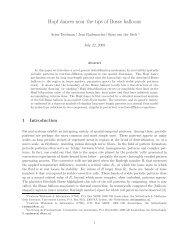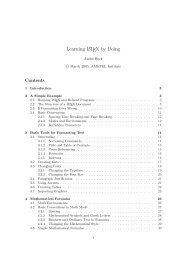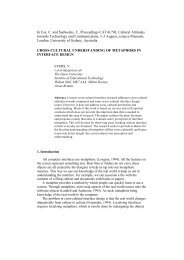The role of metacognitive skills in learning to solve problems
The role of metacognitive skills in learning to solve problems
The role of metacognitive skills in learning to solve problems
You also want an ePaper? Increase the reach of your titles
YUMPU automatically turns print PDFs into web optimized ePapers that Google loves.
Study III: added value <strong>of</strong> the task model 143<br />
knowledge. Spend<strong>in</strong>g time <strong>in</strong> the ORGANISE phase <strong>in</strong> the no-model<br />
condition is positively related <strong>to</strong> both concurrent variables for metacognition,<br />
and spend<strong>in</strong>g time <strong>in</strong> this phase is also positively related <strong>to</strong> the<br />
acquisition <strong>of</strong> specific procedural knowledge. Furthermore, knowledge<br />
acquisition is positively related <strong>to</strong> transfer. This could be <strong>in</strong>terpreted as<br />
<strong>in</strong>dicat<strong>in</strong>g that the relation between metacognition and transfer is mediated<br />
by knowledge acquisition; no direct relation exists. <strong>The</strong> relation<br />
between the time spent <strong>in</strong> the ORGANISE phase, learn<strong>in</strong>g and metacognition<br />
could <strong>in</strong>dicate the follow<strong>in</strong>g: discussion about concepts and<br />
relations <strong>in</strong> the doma<strong>in</strong> <strong>of</strong> KM stimulates the acquisition <strong>of</strong> declarative<br />
knowledge (positive relation between ORGANISE and declarative knowledge).<br />
Ask<strong>in</strong>g each other questions about doma<strong>in</strong> knowledge stimulates<br />
the acquisition <strong>of</strong> declarative knowledge (positive relation between G<br />
META and declarative knowledge). Mak<strong>in</strong>g contributions that <strong>in</strong>dicate<br />
plann<strong>in</strong>g and moni<strong>to</strong>r<strong>in</strong>g <strong>of</strong> learn<strong>in</strong>g behaviour stimulates the development<br />
<strong>of</strong> <strong>in</strong>tuitive task knowledge (positive relation between KM META<br />
and KM model-specific procedural knowledge).<br />
In the model condition, metacognition is not related <strong>to</strong> learn<strong>in</strong>g nor<br />
transfer. Spend<strong>in</strong>g time <strong>in</strong> the FOCUS phase is positively related <strong>to</strong><br />
mak<strong>in</strong>g <strong>metacognitive</strong> contributions. A possible <strong>in</strong>terpretation here is<br />
that discussion <strong>in</strong> the FOCUS phase has a <strong>metacognitive</strong> component <strong>in</strong><br />
terms <strong>of</strong> regulat<strong>in</strong>g learn<strong>in</strong>g behaviour but this does not lead <strong>to</strong> knowledge<br />
acquisition.<br />
6.3.5.3 Construct and predictive validity <strong>of</strong> metacognition<br />
In figure 6.10 the results concern<strong>in</strong>g construct and predictive validity<br />
<strong>of</strong> metacognition are displayed. <strong>The</strong> self-reported use <strong>of</strong> <strong>metacognitive</strong><br />
<strong>skills</strong> before and after task performance are strongly related <strong>in</strong> both<br />
conditions. Concurrent measurements <strong>of</strong> metacognition are not related<br />
<strong>to</strong> the self-report measures.<br />
In the model condition, none <strong>of</strong> the measures <strong>of</strong> metacognition are related<br />
<strong>to</strong> learn<strong>in</strong>g results. In the model condition students make more<br />
group-related task- and <strong>metacognitive</strong> contributions than <strong>in</strong> the nomodel<br />
condition. This can be an <strong>in</strong>dication that <strong>in</strong> the model condition<br />
one needs <strong>to</strong> regulate the use <strong>of</strong> the task model <strong>in</strong>stead <strong>of</strong> regulat<strong>in</strong>g<br />
cognitive activities at the object level.<br />
In the no-model condition, the concurrent measures <strong>of</strong> metacognition<br />
are related <strong>to</strong> learn<strong>in</strong>g results. <strong>The</strong> amount <strong>of</strong> <strong>metacognitive</strong> doma<strong>in</strong>related<br />
contributions positively <strong>in</strong>fluences the acquisition <strong>of</strong> KM modelspecific<br />
procedural knowledge. Group-related <strong>metacognitive</strong> contributions<br />
positively <strong>in</strong>fluence acquisition <strong>of</strong> declarative knowledge. This suggests<br />
that without a task model, regulation <strong>of</strong> the object-level results <strong>in</strong>


